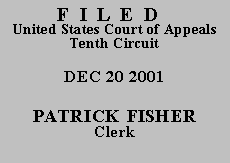

| UNITED STATES OF AMERICA, |
|
| v. | |
| LOUIE GREGORY GARCIA, |
(D.C. Nos. CV-01-482-JC/WWD; CR-95-330-JC) |
After examining defendant-appellant Louie Gregory Garcia's brief and the appellate record, this panel has determined unanimously that oral argument would not materially assist the determination of this appeal. See Fed. R. App. P. 34(a)(2). The case is, therefore, ordered submitted without oral argument.
Mr. Garcia, a federal prisoner proceeding pro se, requests a certificate of appealability ("COA") in order to appeal the denial of his 28 U.S.C. § 2255 habeas petition. For the reasons stated below, we deny a COA and dismiss the appeal.
In 1996, Mr. Garcia pleaded guilty to one violation of 18 U.S.C. §§ 3 (acting as an accessory after the fact to a federal crime) and 2119 (carjacking) and one violation of 18 U.S.C. § 924(c)(1) (using or carrying a firearm during and in relation to a crime of violence [here, the carjacking]). Pursuant to the terms of Mr. Garcia's plea agreement, the trial court imposed a 240-month term of imprisonment. Mr. Garcia appealed his conviction; we affirmed both the conviction and sentence on August 7, 1997. See United States v. Garcia, No. 96-2152, 1997 WL 446910 (10th Cir. Aug. 7, 1997) (unpublished disposition). Mr. Garcia did not elect to seek certiorari in the United States Supreme Court; hence, Mr. Garcia's conviction and sentence became final ninety days after our August 7, 1997 order and judgment. See Sup. Ct. R. 13(1) (establishing a ninety-day window during which a defendant may seek certiorari from a judgment of a federal court of appeals).
On April 30, 2001, Mr. Garcia filed his first 28 U.S.C. § 2255 habeas petition; that petition is the subject of this appeal. In his petition, Mr. Garcia raises a number of arguments predicated upon his contention that § 2119, which underlies each of the charges to which he pleaded guilty, is unconstitutional. In Mr. Garcia's view, the Supreme Court's recent decision in United States v. Morrison, 529 U.S. 598 (2000), dictates the conclusion that Congress exceeded its Commerce Clause power in enacting § 2119. Thus, according to Mr. Garcia, he is 1) "actually innocent" of violating § 2119, Rec. doc. 3, at 2 (Petitioner's Motion for Reconsideration), and 2) the federal district in which Mr. Garcia was convicted lacked subject matter jurisdiction over his case.
The district court first dismissed Mr. Garcia's petition as untimely in light of § 2255's one-year statute of limitations. On Mr. Garcia's Motion for Reconsideration, however, the district court recognized that a claim of actual innocence provides, in at least some circumstances, a means of avoiding the § 2255 time bar. See Bousley v. United States, 523 U.S. 614, 623-24 (1998) (remanding for consideration of whether § 2255 petitioner Mr. Bousley could demonstrate actual innocence and thereby overcome his procedural default). Nevertheless, the district court concluded that § 2119 remains constitutional even after Morrison; thus, in the district court's view, Mr. Garcia could not demonstrate either actual innocence or lack of subject matter jurisdiction.
Pursuant to Haines v. Kerner, 404 U.S. 519, 520-21 (1972) (per curiam), we liberally construe Mr. Garcia's contentions. We agree with Mr. Garcia that, in at least certain circumstances, claims of actual innocence do permit a petitioner to avoid the § 2255 time bar. Because, however, we also agree with the district court that § 2119 survives Morrison, we need not here determine whether Mr. Garcia's claim is properly characterized as one of 'actual innocence.'
In Morrison, the Supreme Court held that portions of the Violence Against Women Act exceeded Congress' Commerce Clause power; the Court concluded that Congress may not regulate "noneconomic, violent criminal conduct based solely on that conduct's aggregate effect on interstate commerce." 529 U.S. at 617 (emphasis added). Section 2119 criminalizes particular carjackings based not solely upon the aggregate effect of carjackings but, rather, based upon an individualized determination that the automobile in question "has been transported, shipped, or received in interstate or foreign commerce." § 2119. Thus, § 2119 remains constitutional after Morrison. See United States v. Taylor, 226 F.3d 593, 598-600 (7th Cir. 2000) (upholding the constitutionality of § 2119 in the face of a Morrison challenge); cf. United States v. Malone, 222 F.3d 1286, 1294-95 (10th Cir. 2000) (upholding the constitutionality of the Hobbs Act, 18 U.S.C. § 1951, in the face of a Morrison challenge); United States v. Romero, 122 F.3d 1334, 1339 (10th Cir. 1997) (upholding the constitutionality of § 2119 following the Supreme Court's decision in United States v. Lopez, 514 U.S. 549, 551-568 (1995) (another case limiting the Commerce Clause power)).
To be entitled to a COA, Mr. Garcia must make a "substantial showing of the denial of a constitutional right." 28 U.S.C. § 2253(c)(2). Mr. Garcia may make this showing by demonstrating that the issues he raises are debatable among jurists, that a court could resolve the issues differently, or that the questions presented deserve further proceedings. See Slack v. McDaniel, 529 U.S. 473, 483-84 (2000).
Having reviewed Mr. Garcia's request for a COA, his appellate brief, the district court's orders, and the appellate record, we conclude that Mr. Garcia has failed to make the required showing for a COA. Accordingly, and for substantially the same reasons set forth in the district court's June 4, 2001 order, we DENY Mr. Garcia's request for a COA and DISMISS his appeal.
Entered for the Court,
Robert H. Henry
Circuit Judge
*. This order and judgment is not binding precedent, except under the doctrines of res judicata, collateral estoppel, and law of the case. The court generally disfavors the citation of orders and judgments; nevertheless, an order and judgment may be cited under the terms and conditions of 10th Cir. R. 36.3.